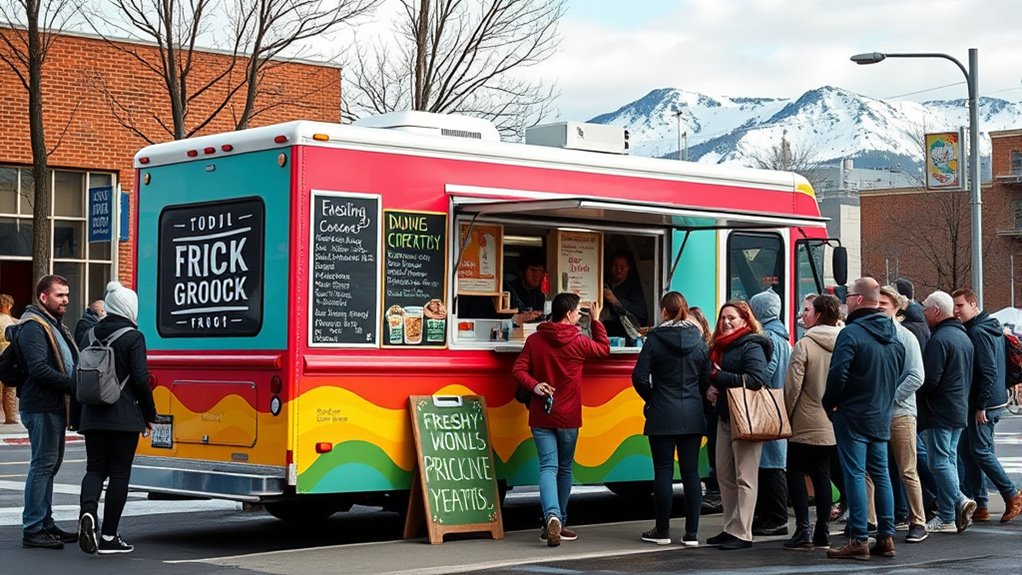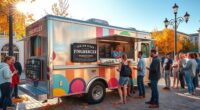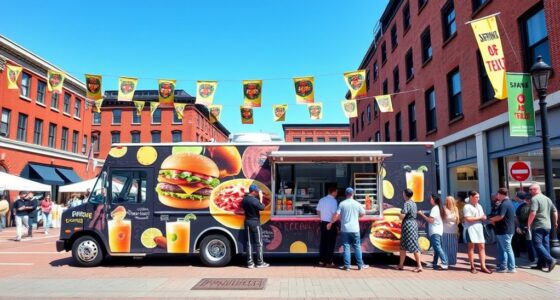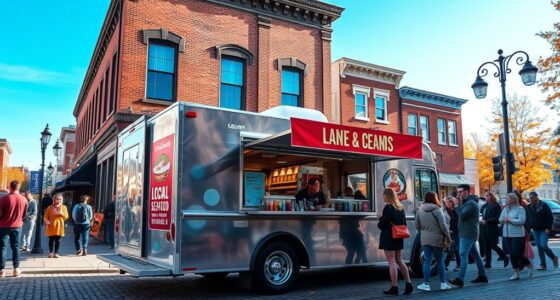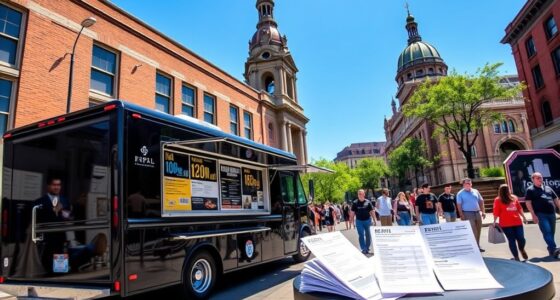To open a food truck in Burlington, Vermont, you’ll need various permits like a Food Service Establishment License (~$140), a Peddler’s License ($100-$300), and possibly a short-term license for events. Expect startup costs between $46,700 and $187,440, plus ongoing expenses. Secure prime locations in limited vending areas and ensure your menu is simple, hygienic, and transportable. Effective marketing, especially via social media, boosts your success. Continue exploring to uncover how to navigate permits, costs, and more specifics for your venture.
Key Takeaways
- Obtain necessary permits including Food Service Establishment License (~$140), Peddler’s License, and short-term event licenses.
- Startup costs vary from $46,700 to $187,440; budget for permits, truck, ingredients, and ongoing expenses.
- Limited vending locations are available mainly in downtown Burlington; additional sites require petitions and approvals.
- Design a menu with easily stored, minimally prepared items that meet Vermont food safety standards and facilitate quick service.
- Use social media, participate in community events, and implement loyalty programs to effectively market and grow your food truck business.
Navigating Permits and Licensing Requirements in Burlington
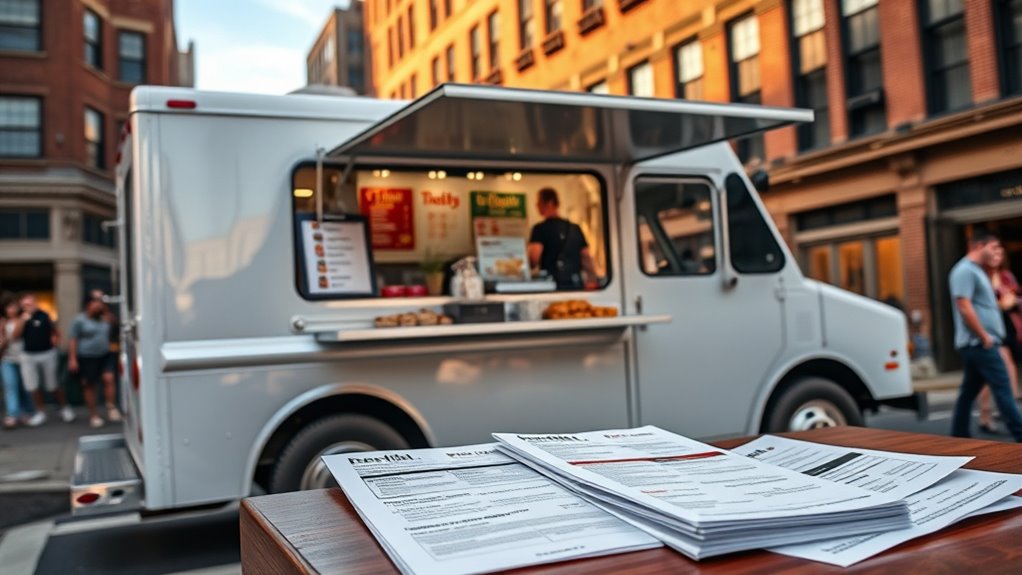
Managing permits and licensing requirements in Burlington can seem complex, but understanding the process is essential for operating a food truck legally. You’ll need a Food Service Establishment License, costing around $140, for all retail food operations. If you prepare and sell food on the move, a Commercial Caterer License is also required. A Peddler’s License, valid from June 1 to May 31, is necessary, with fees ranging from $100 to $300 depending on your district. For temporary events, a Short-term Food Service license costs about $125. You must register your business with the Vermont Secretary of State and pass background checks for certain licenses, like the Peddler’s. Providing proof of liability insurance and renewing your licenses annually is vital to stay compliant. Additionally, understanding affiliate disclosures can help ensure transparency and compliance with marketing regulations related to your business.
Understanding Costs and Fees for Your Food Truck Business
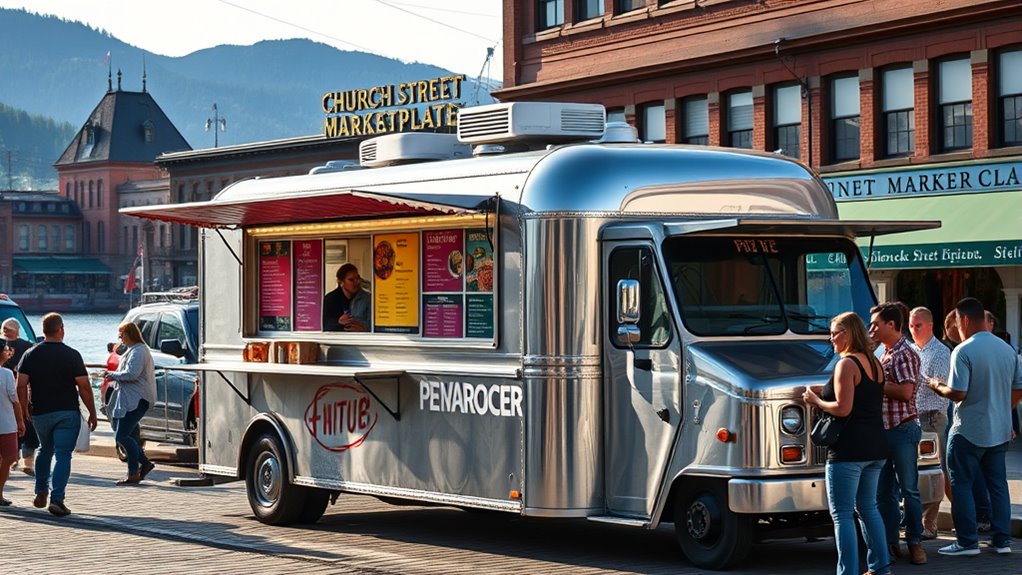
Understanding the costs and fees associated with starting and running your food truck in Burlington is essential for budgeting and ensuring profitability. Startup costs typically range from $46,700 to $187,440, depending on whether you rent or buy your truck. These expenses include the vehicle, kitchen equipment, permits, insurance, branding, and POS systems. Your menu choices also impact costs, with initial ingredient inventory averaging $1,000 to $2,000. Ongoing expenses include ingredients, fuel, maintenance, staff wages, and insurance. Licensing fees, such as the $140 annual food service license, and additional permits, should be factored into your budget. Renting a truck for catering averages $1,541 per event, with costs varying based on menu and event size. Properly estimating these costs helps you plan for profitability and growth. Understanding local permit requirements is crucial to avoid unexpected expenses and delays. Additionally, being aware of Startup costs associated with purchasing or leasing your truck can help you make informed financial decisions.
Finding Prime Locations and Navigating Zoning Regulations
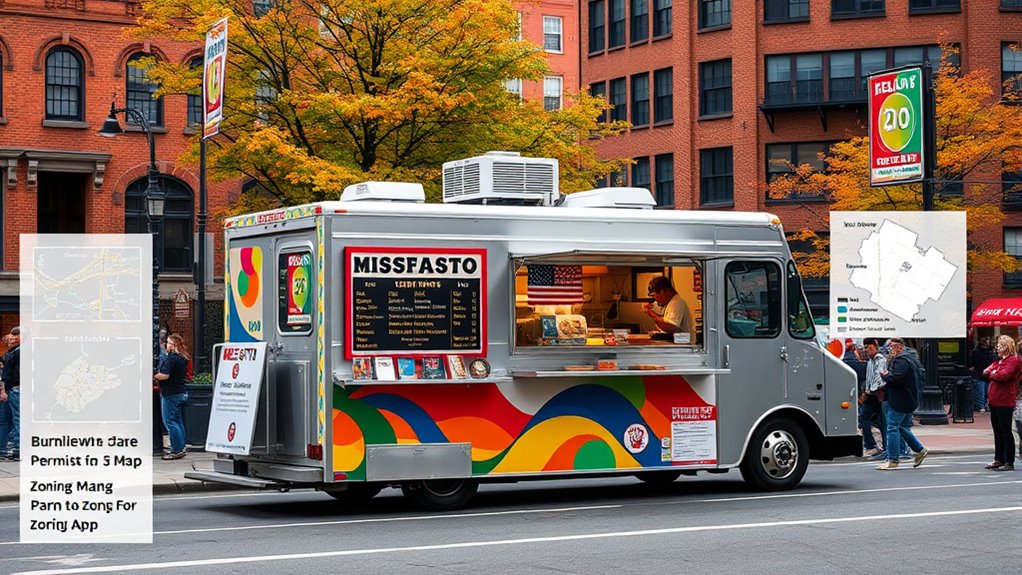
Finding prime locations for your food truck in Burlington requires you to work within the city’s designated vending areas, primarily in the central business district. These sites are limited and managed by the city council license committee, with only seven spaces on University Place. Sites are allocated on a first-come, first-served basis, with waitlists based on seniority. You must comply with city parking ordinances, removing your vehicle outside operating hours, typically 7 a.m. to 7 p.m. If you want additional locations, you’ll need to petition the license committee and city council. The Department of Permitting & Inspections oversees zoning, land use, and permits, providing guidance to ensure your truck operates legally and within designated zones. Additionally, the city enforces strict zoning regulations to prevent congestion and ensure safety within the district. Understanding these zoning regulations is crucial for compliance and successful operation.
Crafting a Compliant and Appealing Menu
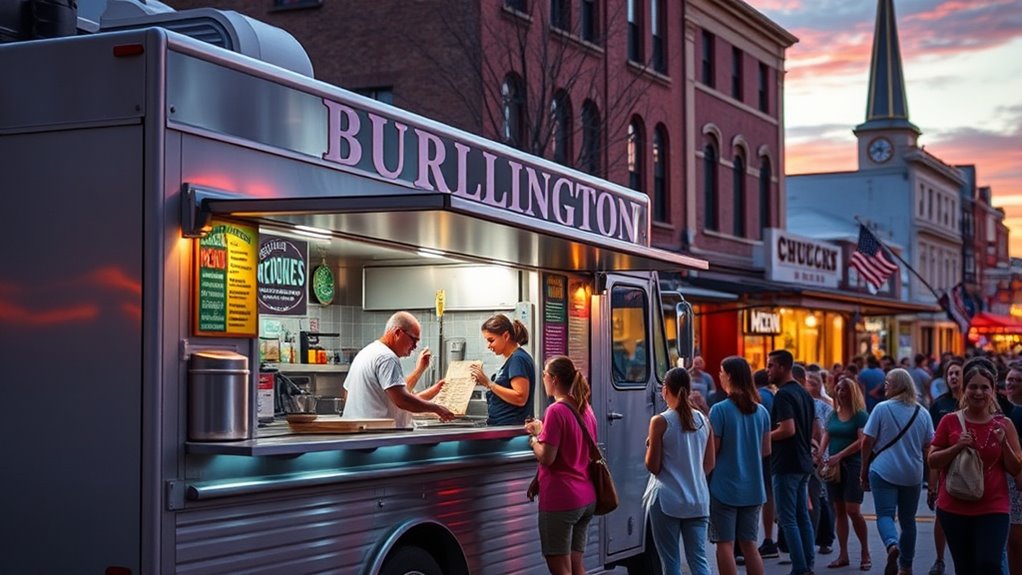
Crafting a compliant and appealing menu for your Burlington food truck requires careful attention to Vermont’s food safety regulations and practical design considerations. To do this effectively, focus on these key aspects:
- Select menu items that can be stored safely in dry or refrigerated spaces on your truck, minimizing prep time and contamination risks.
- Opt for foods that need little on-site preparation, reducing equipment needs and ensuring hygiene.
- Choose easily wrapped or containerized foods to prevent contamination during transport and handling.
- Incorporate dishes that can be prepared with utensils that are simple to sanitize, following hygiene protocols and avoiding cross-contact.
- Ensure that all ingredients and prepared foods are stored in food-grade containers and kept at proper temperatures to prevent foodborne illnesses meeting Vermont’s food safety standards. Additionally, integrating AI-powered inventory management can help monitor stock levels and storage conditions more effectively.
Balancing regulatory compliance with customer appeal will help you build a successful, safe, and attractive menu.
Effective Marketing Strategies to Grow Your Food Truck Venture
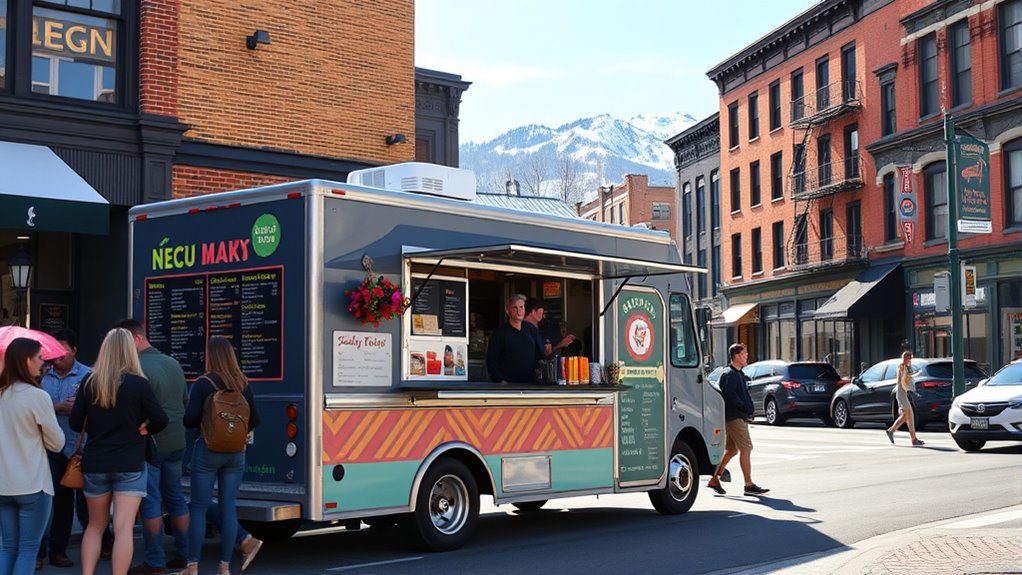
Promoting your Burlington food truck effectively can substantially boost your customer base and sales. Social media is a powerful tool—68% of food truck owners use it regularly, with Facebook leading at 75%. Engaging actively on social platforms can increase sales by 20% and encourage customers to spend about 15% more. Mobile apps that help locate food trucks have seen a 35% rise in downloads, making online visibility essential. Participating in community events and festivals is also highly effective, with 80% of trucks attending at least three annually, boosting brand recognition and foot traffic. Implementing customer loyalty programs can lead to a 30% increase in repeat visits. Using data analytics and targeted advertising ensures your marketing efforts are efficient, helping you attract and retain loyal customers in Burlington’s vibrant market. Digital marketing strategies have become increasingly important, with 80% of food trucks leveraging analytics and review platforms to enhance customer engagement and optimize their marketing efforts. Additionally, emphasizing menu offerings such as classic American diner staples like corned beef hash, eggs Benedict, or pancakes with maple syrup can help attract a diverse customer base.
Frequently Asked Questions
Are There Any Restrictions on Operating Hours for Food Trucks in Burlington?
You wonder if there are restrictions on your food truck’s operating hours in Burlington. While there’s no strict city ordinance limiting hours in public spaces, you must follow zone rules, avoid restricted areas like the Central Peddlers District, and adhere to event-specific schedules. Your annual peddler license allows you to operate throughout the permit year, but special event or park restrictions may limit your hours during certain times.
Can I Operate My Food Truck Year-Round in Burlington’s Climate?
You can operate your food truck year-round in Burlington, but weather and regulations pose challenges. During winter, long, cold months with snow and icy roads restrict outdoor vending, especially in central districts. You’ll need proper insulation, heating, and compliance with permits and safety standards. To succeed, consider indoor markets or winter events, adapt your menu for cold weather, and plan for higher costs. Flexibility and creative marketing help maintain your business through all seasons.
What Specific Health and Safety Inspections Are Required Before Opening?
Like a knight preparing his armor, you’ll need to pass health and safety inspections before launching. You must undergo a Vermont Department of Health food safety inspection, covering critical violations like proper cooking temperatures, cross-contamination, and personal hygiene. Additionally, your truck needs a fire safety check, ensuring propane tanks and fire suppression systems meet code. Display valid permits visibly, and make sure water, waste, and sanitation equipment comply to avoid delays.
Are There Any Special Permits Needed for Selling Alcohol From a Food Truck?
You’ll need a separate liquor license to sell alcohol from your food truck in Vermont, which involves applying through the Vermont Department of Liquor & Lottery. In Burlington, you also must get approval from the local License Committee and possibly additional permits like a Peddler License or encroachment permits. Make certain you meet all state and local regulations, including background checks, insurance, and safety standards, to operate legally.
How Do I Handle Waste Disposal and Wastewater Management Legally?
To handle waste disposal and wastewater management legally, you need to direct wastewater into an approved holding tank with at least 7 gallons capacity, then dispose of it at a permitted treatment facility. You should also separate food scraps for composting or approved disposal, using local services or composting facilities. Regular maintenance of tanks and proper record-keeping guarantee you stay compliant with Vermont health and environmental regulations.
Conclusion
Starting your food truck in Burlington is like planting a seed—you’ll need the right permits, a well-crafted menu, and smart marketing. With careful navigation of regulations and a dash of creativity, your venture can flourish amidst the city’s vibrant food scene. Stay adaptable and persistent, and your food truck will become a beloved fixture. Remember, success isn’t just a destination; it’s a journey paved with passion and perseverance.
